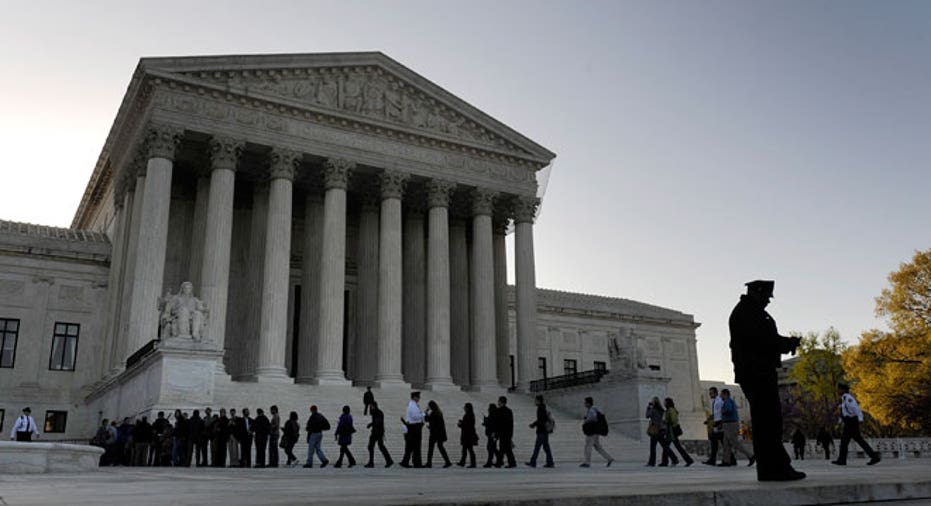Supreme Court Divided on Obama Health-Insurance Mandate

The U.S. Supreme Court on Tuesday appeared closely divided along ideological lines over whether Congress had the power to require most people in the United States to buy medical insurance, with conservative justices asking skeptical questions about President Barack Obama's healthcare law and liberals defending it.
During two dramatic hours of arguments, pivotal justices on the nine-member court suggested they would uphold the so-called individual mandate requiring people to obtain insurance only if they believed they were not giving Congress broad new powers over people's lives.
Chief Justice John Roberts and Justice Anthony Kennedy, two conservatives who could join the four liberal justices to uphold the law, pressed an attorney for the Obama administration to say where the limits would be on federal power if people who opted against insurance were forced to buy coverage.
Complete Transcript: Supreme Court Hears Health-Care Arguments, Day 2
Both justices also raised to the two lawyers challenging the individual mandate the government's contention that Congress is validly regulating people who already are in the market because virtually everyone is going to need healthcare at some point.
"That's my concern in the case," Kennedy said, noting that young, uninsured people affect the overall market by not paying into it and ultimately receiving care over the long term.
The four liberal justices, Stephen Breyer, Ruth Bader Ginsburg, Sonia Sotomayor and Elena Kagan, all indicated that they believed the mandate was valid under the U.S. Constitution. Two conservatives, Antonin Scalia and Samuel Alito, were vocal in their skepticism about the validity of the requirement.
Scalia in particular seemed concerned that Congress and the federal government would have unlimited powers if the law was upheld. "What is left? What else can it not do?"
The ninth justice, conservative Clarence Thomas who is expected to vote against the law, asked no questions. He has not asked a question from the bench for more than six years.
At the end of the morning, the momentous dispute over Obama's signature domestic policy achievement appeared to be a close case and that arguments among the justices would continue behind closed doors as they draft their opinions, likely to be released in late June.
A decision by the high court, expected just as the presidential and congressional campaigns will be moving into high gear, will likely be a flashpoint leading up to the November 6 general election no matter how the court rules.
The court's ruling on the insurance requirement could decide the fate of the massive multi-part healthcare overhaul meant to improve access to medical care and extend insurance to more than 30 million people.
Outside the white marble courthouse, a crowd of supporters and protesters filled the wide sidewalk, marching, chanting and carrying signs. A motorcycle shop manager from Massachusetts, Michael Wade, called the healthcare law a "power grab" by Obama. Supporters of the law marched and chanted: "We love Obamacare."
The centerpiece of the law is the mandate that most people obtain health insurance by 2014 or pay a penalty.
The law, reviled by U.S. conservatives and denounced by the Republican candidates competing to become their party's nominee to face Obama in November, is being challenged by 26 of the 50 states and a small-business trade group. The challengers contend Congress exceeded its authority to regulate commerce with that individual mandate.
In more practical terms, the challengers say that if the government can force people to enter the insurance market, it would have latitude to force people to engage in other behavior, whether it be to buy American-made cars or even to eat broccoli.
A New York Times/CBS News poll showed that a narrow majority of Americans oppose the individual mandate, 51 percent to 45 percent, but strongly supported other provisions of the law covering pre-existing medical conditions and allowing young adults to stay on their parents' health insurance plans.
The Obama administration argues that virtually everyone will need medical care and that those who opt not to buy insurance put a disproportionate burden on the system. It has defended the law as a response to a national crisis and constitutional.
Among those who obtained a coveted ticket to the arguments included top Obama administration officials as well as Democrats who helped draft the law like Montana U.S. Senator Max Baucus and Republican opponents like Iowa U.S. Senator Chuck Grassley.
(With additional reporting by Jeremy Pelofsky and Ian Simpson; Editing by Howard Goller and Will Dunham)



















